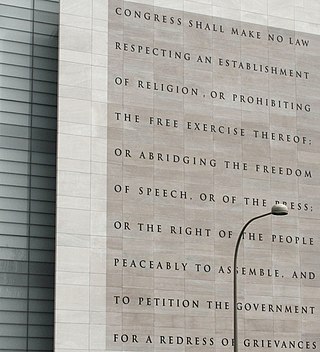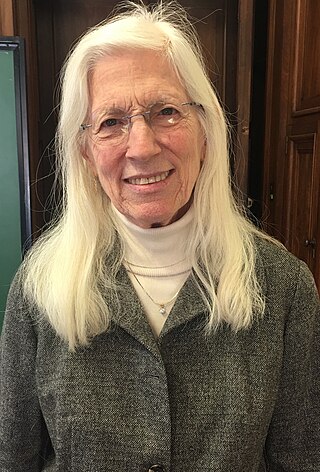Related Research Articles
Engel v. Vitale, 370 U.S. 421 (1962), was a landmark United States Supreme Court case in which the Court ruled that it is unconstitutional for state officials to compose an official school prayer and encourage its recitation in public schools, due to violation of the First Amendment. The ruling has been the subject of intense debate.

In the United States, freedom of speech and expression is strongly protected from government restrictions by the First Amendment to the U.S. Constitution, many state constitutions, and state and federal laws. Freedom of speech, also called free speech, means the free and public expression of opinions without censorship, interference and restraint by the government. The term "freedom of speech" embedded in the First Amendment encompasses the decision what to say as well as what not to say. The Supreme Court of the United States has recognized several categories of speech that are given lesser or no protection by the First Amendment and has recognized that governments may enact reasonable time, place, or manner restrictions on speech. The First Amendment's constitutional right of free speech, which is applicable to state and local governments under the incorporation doctrine, prevents only government restrictions on speech, not restrictions imposed by private individuals or businesses unless they are acting on behalf of the government. However, It can be restricted by time, place and manner in limited circumstances. Some laws may restrict the ability of private businesses and individuals from restricting the speech of others, such as employment laws that restrict employers' ability to prevent employees from disclosing their salary to coworkers or attempting to organize a labor union.
First National Bank of Boston v. Bellotti, 435 U.S. 765 (1978), is a U.S. constitutional law case which defined the free speech right of corporations for the first time. The United States Supreme Court held that corporations have a First Amendment right to make contributions to ballot initiative campaigns. The ruling came in response to a Massachusetts law that prohibited corporate donations in ballot initiatives unless the corporation's interests were directly involved.
Reva B. Siegel is the Nicholas deB. Katzenbach Professor of Law at Yale Law School. Siegel's writing draws on legal history to explore questions of law and inequality, and to analyze how courts interact with representative government and popular movements in interpreting the Constitution. She is currently writing on the role of social movement conflict in guiding constitutional change, addressing this question in recent articles on reproductive rights, originalism and the Second Amendment, the "de facto ERA," and the enforcement of Brown. Her publications include Processes of Constitutional Decisionmaking ; The Constitution in 2020 ; and Directions in Sexual Harassment Law. Professor Siegel received her B.A., M.Phil, and J.D. from Yale University, clerked for Judge Spottswood William Robinson III on the D.C. Circuit, and began teaching at the University of California at Berkeley. She is a member of the American Academy of Arts and Sciences, and is active in the American Society for Legal History, the Association of American Law Schools, the American Constitution Society, in the national organization and as faculty advisor of Yale's chapter. She was elected to the American Philosophical Society in 2018.
Michael William McConnell is an American jurist who served as a United States circuit judge of the United States Court of Appeals for the Tenth Circuit from 2002 to 2009. Since 2009, McConnell has been a professor and Director of the Stanford Constitutional Law Center at Stanford Law School. He is also a senior fellow at Stanford University's Hoover Institution, and Senior Of Counsel to the Litigation Practice Group at Wilson Sonsini Goodrich & Rosati. In May 2020, Facebook appointed him to its content oversight board. In 2020, McConnell published The President Who Would Not Be King: Executive Power under the Constitution under Princeton University Press.

Thomas Eugene Baker is a constitutional law scholar, Professor of Law, and founding member of the Florida International University College of Law. With four decades of teaching experience, Baker has authored eighteen books, including two leading casebooks, has published more than 200 scholarly articles in leading law journals, and has received numerous teaching awards.
Intermediate scrutiny, in U.S. constitutional law, is the second level of deciding issues using judicial review. The other levels are typically referred to as rational basis review and strict scrutiny.

Jack M. Balkin is an American legal scholar. He is the Knight Professor of Constitutional Law and the First Amendment at Yale Law School. Balkin is the founder and director of the Yale Information Society Project (ISP), a research center whose mission is "to study the implications of the Internet, telecommunications, and the new information technologies for law and society." He also directs the Knight Law and Media Program and the Abrams Institute for Free Expression at Yale Law School.
Bruce P. Frohnen is a Professor of Law at Ohio Northern University College of Law, where he teaches courses in Public and Constitutional Law, Jurisprudence, and Legal Profession.

Burt Neuborne is the Norman Dorsen Professor of Civil Liberties at New York University School of Law and the founding legal director of the Brennan Center for Justice.
In law, commercial speech is speech or writing on behalf of a business with the intent of earning revenue or a profit. It is economic in nature and usually attempts to persuade consumers to purchase the business's product or service. The Supreme Court of the United States defines commercial speech as speech that "proposes a commercial transaction".
Rosenberger v. Rector and Visitors of the University of Virginia, 515 U.S. 819 (1995), was an opinion by the Supreme Court of the United States regarding whether a state university might, consistent with the First Amendment, withhold from student religious publications funding provided to similar secular student publications. The University of Virginia provided funding to every student organization that met funding-eligibility criteria, which Wide Awake, the student religious publication, fulfilled. The university's defense claimed that denying student activity funding to the religious magazine was necessary to avoid the University's violating the Establishment Clause of the First Amendment.

Margaret Jane Radin is the Henry King Ransom Professor of Law, emerita, at the University of Michigan Law School by vocation, and a flutist by avocation. Radin has held law faculty positions at University of Toronto, University of Michigan, Stanford University, University of Southern California, and University of Oregon, and has been a faculty visitor at Harvard University, Princeton University, University of California at Berkeley, and New York University. Radin's best known scholarly work explores the basis and limits of property rights and contractual obligation. She has also contributed significantly to feminist legal theory, legal and political philosophy, and the evolution of law in the digital world. At the same time, she has continued to perform and study music.
Bigelow v. Virginia, 421 U.S. 809 (1975), was a United States Supreme Court decision that established First Amendment protection for commercial speech. The ruling is an important precedent on challenges to government regulation of advertising, determining that such publications qualify as speech under the First Amendment.
The Harvard Law & Policy Review is a law journal and the official journal of the American Constitution Society, a progressive legal organization. It was established in 2007. The journal publishes two printed editions per year, as well as additional content posted exclusively online. It is edited by Harvard Law School students and typically has a staff of approximately 75 students. The journal publishes articles presenting progressive ideas for law and policy written by legal scholars, policymakers, practitioners, and students.

Article 14 of the Constitution of the Republic of Singapore, specifically Article 14(1), guarantees to Singapore citizens the rights to freedom of speech and expression, peaceful assembly without arms, and association. However, the enjoyment of these rights may be restricted by laws imposed by the Parliament of Singapore on the grounds stated in Article 14(2) of the Constitution.
NAACP v. Button, 371 U.S. 415 (1963), is a 6-to-3 ruling by the Supreme Court of the United States which held that the reservation of jurisdiction by a federal district court did not bar the U.S. Supreme Court from reviewing a state court's ruling, and also overturned certain laws enacted by the state of Virginia in 1956 as part of the Stanley Plan and massive resistance, as violating the First and Fourteenth Amendments to the United States Constitution. The statutes struck down by the Supreme Court had expanded the definitions of the traditional common law crimes of champerty and maintenance, as well as barratry, and had been targeted at the NAACP and its civil rights litigation.
Martin H. Redish is the Louis and Harriet Ancel Professor of Law and Public Policy at the Northwestern University Pritzker School of Law. Redish has written 19 books and over a hundred law review articles in the areas of civil procedure and constitutional law, among others. He is among the most frequently cited American legal scholars.

In United States constitutional law, the penumbra includes a group of rights derived, by implication, from other rights explicitly protected in the Bill of Rights. These rights have been identified through a process of "reasoning-by-interpolation", where specific principles are recognized from "general idea[s]" that are explicitly expressed in other constitutional provisions. Although researchers have traced the origin of the term to the nineteenth century, the term first gained significant popular attention in 1965, when Justice William O. Douglas's majority opinion in Griswold v. Connecticut identified a right to privacy in the penumbra of the constitution.
Hate speech in the United States cannot be directly regulated by the government due to the fundamental right to freedom of speech protected by the Constitution. While "hate speech" is not a legal term in the United States, the U.S. Supreme Court has repeatedly ruled that most of what would qualify as hate speech in other western countries is legally protected speech under the First Amendment. In a Supreme Court case on the issue, Matal v. Tam (2017), the justices unanimously reaffirmed that there is effectively no "hate speech" exception to the free speech rights protected by the First Amendment and that the U.S. government may not discriminate against speech on the basis of the speaker's viewpoint.
References
- 1 2 "Faculty - University of Virginia School of Law". University of Virginia School of Law. July 22, 2016. Retrieved October 31, 2021.
- ↑ "Everything we do is tentative. An interview with Prof. Frederick Schauer". Netherlands Journal of Legal Philosophy. Retrieved March 13, 2016.
- 1 2 Macklem, Peter; Rogerson, Carol, eds. (2017). Canadian Constitutional Law (5th ed.). Toronto: Emond Montgomery Publications Limited. p. 991. ISBN 978-1-77255-070-2.
- ↑ "Analogy, Expertise, and Experience | The University of Chicago Law Review". lawreview.uchicago.edu. Retrieved January 21, 2020.
- ↑ Reviewed by Mark Greenberg, How to Explain Things with Force, 129 Harv. L. Rev. 1932 (2016).
- ↑ Reviewed by Lee, Felicia R. (December 13, 2003). "Discriminating? Yes. Discriminatory? No". The New York Times . Retrieved October 14, 2017.
- ↑ Reviewed by Rakowski, Eric (July 1993). "Book Review". Ethics. 103 (4): 828–830. doi:10.1086/293562.